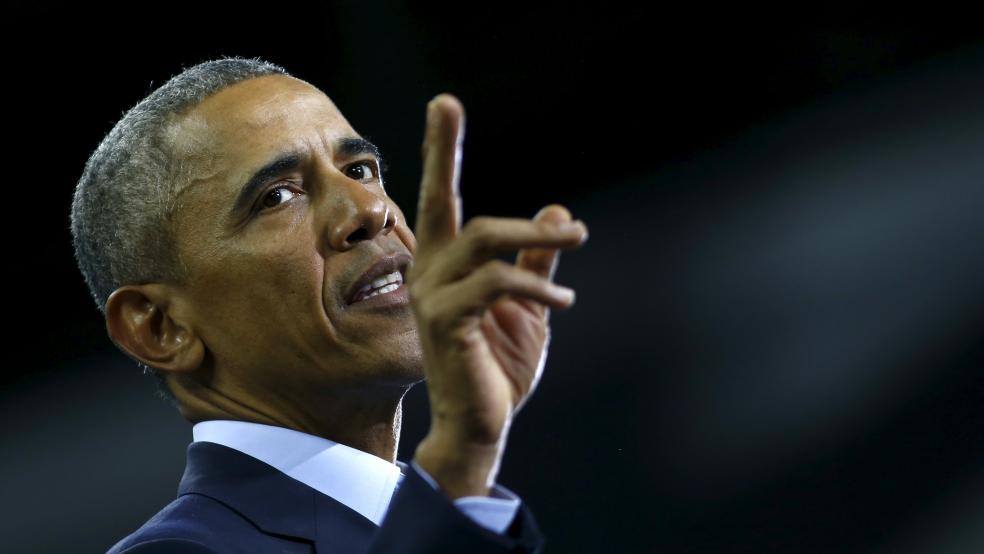Former Gov. Bobby Jindal of Louisiana was a scourge of the Affordable Care Act and spent considerable time during his unsuccessful bid for the GOP presidential nomination vowing to eviscerate President Obama’s signature national health insurance program.
Jindal’s Democratic successor, Gov. John Bel Edwards, embraced Obamacare wholeheartedly and fulfilled a campaign pledge by signing an executive order on Tuesday expanding Medicaid coverage. Louisiana is now the 31st state along with the District of Columbia to adopt the expanded Medicaid program, providing health care insurance to millions of poor Americans.
Related: Some GOP Governors Flip for Medicaid Funds -- on Their Terms
Obama appeared with Edwards in Baton Rouge on Thursday to praise the new governor and to put in a plug for his controversial program. "He's already delivering for the people of Louisiana," Obama said.
With just a year left in his presidency, Obama is scurrying to lock in key elements of the Affordable Care Act to make it more difficult to dismantle if the Republicans manage to win control of the White House or expand their majorities in the Senate and House.
A week ago, the Department of Health and Human Services announced that more than 11.3 million people had signed up for health coverage under Obamacare in all 50 states and D.C. with several weeks remaining in the 2016 enrollment period – well ahead of projected enrollments for 2016.
HHS Secretary Sylvia Mathews Burwell argued that Obamacare was finally catching on with the country, despite polls showing that roughly 50 percent of Americans still disapprove of it and many complain about rising premiums and copayments.
Now the administration is dangling new incentives to lock in an expansion of Medicaid benefits authorized under the three-year-old Affordable Care Act program.
Related: Nearly Half of Obamacare Co-Ops Are Closing
The Obama administration late Wednesday floated a plan that would enable states that have yet to sign up for expanded Medicaid to qualify for three years of full federal funding if they take part in the program – the same deal granted to the 31 states already on board. After that, they would be responsible for covering 10 percent of the total cost.
Nineteen Republican run have refused to participate in expanded Medicaid, which entitles non-elderly single people, including students who earn up to 133 percent of the federal poverty level, to benefit from the program.
Obama intends to seek legislative authority for this incentive as part of his fiscal 2017 budget submission next month, according Office of Management and Budget Director Shaun Donovan.
“This common-sense proposal makes the expansion as good a deal for states that expand now as it is for the states that have already done so,” Donovan wrote in a blog post. “It is further evidence of the Administration’s willingness to work with states to build on recent progress in improving health coverage and making Medicaid affordable to states and taxpayers alike.”
Related: The Unintended Consequence of Expanding Medicaid
Prospects for passage of this legislative authority are slim at best in a Republican controlled Congress that just recently sent Obama a bill that would have repealed the 2010 Affordable Care Act. The president vetoed the measure.
However, there are signs that the expanded Medicaid program is gaining in popularity and staying power. A handful of states that initially opposed the offer – including Arkansas, Indiana, Iowa and Michigan – subsequently obtained waivers in order to tailor the program to more conservative tastes. In some cases, dramatic changes were made to the program, including imposing premiums and cost sharing on some beneficiaries depending on their incomes and other measures to bring down the overall cost.
Newly ensconced Kentucky Gov. Gov. Matt Bevin, a Tea Party Republican, announced plans to shut down a state-run Obamacare program and turn over operations to an insurance exchange run by the federal government. However, he backed down from his vow to end the Medicaid expansion program, although he may seek a waiver as well.
Meanwhile, Republican governors in two other “hold-out” states – Wyoming and South Dakota – are trying to convince their state legislatures to expand the Medicaid program.
Edwards, the lone Democratic governor in the Deep South, ran as a conservative but pledged to try to relieve the plight of the roughly 300,000 Louisiana residents who live in poverty or struggle to make ends meet.
“This will not only afford them peace of mind, but also to help prevent them from slipping further into poverty and give them a fighting chance for a better life,” Edwards said in signing the Medicaid executive order, according to The New York Times.




